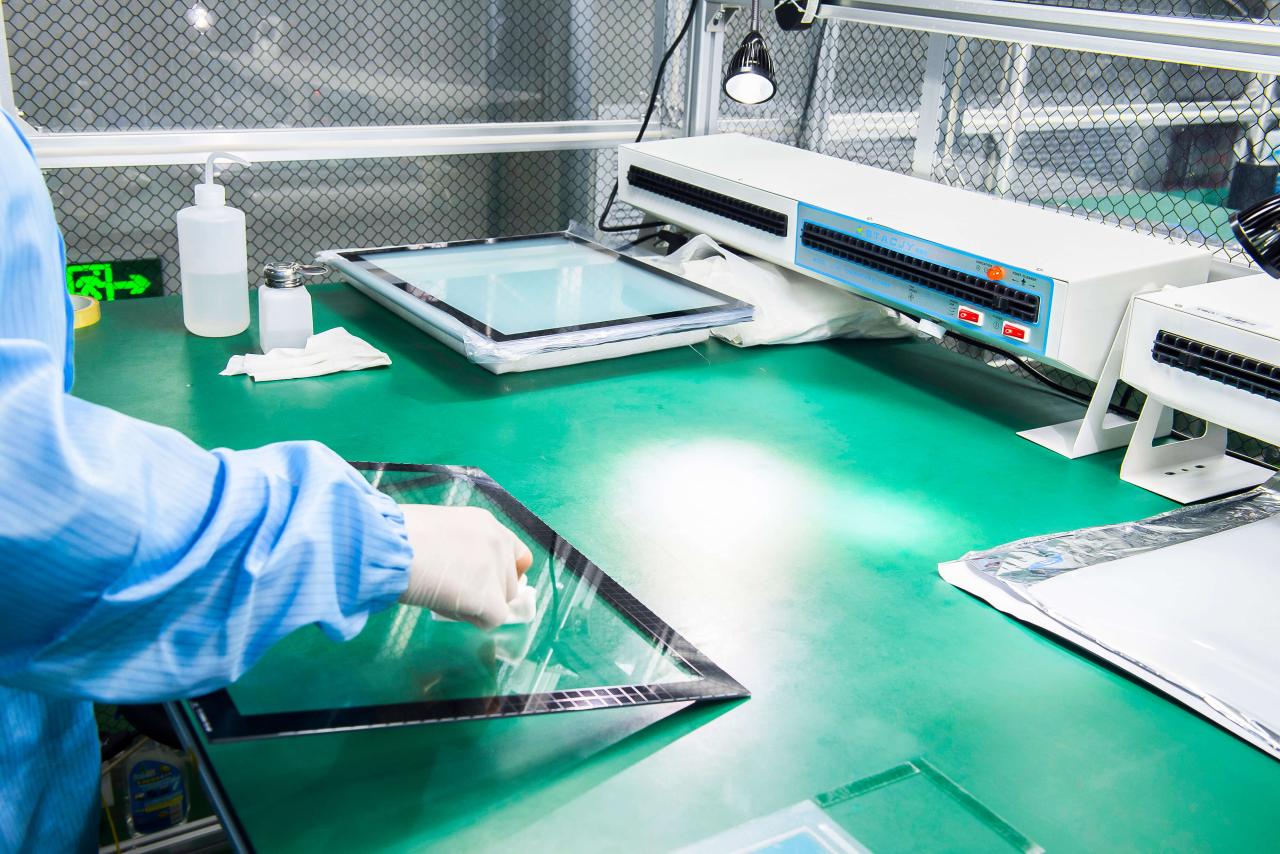News
Do You Want to Know The Touch Screen Manufacturing Process?
The touch screen manufacturing process is similar to the manufacturing process of the liquid crystal display panel in many places. In both cases, transparent electrodes are formed on two opposing substrates. Then, it will print the functional material on the transparent electrode to form a pattern, and then it bond the upper and lower substrates together and transfer to the final process.
Purchase Substrates With Transparent Electrodes For Manufacturing Process
Most of the touch screen manufacturers directly purchase the substrates with transparent electrodes. And apply them to the company’s manufacturing process. The lower glass substrates invested are mainly the second-generation liquid crystal display panels with a size of 370_ x 470mm or 400mm x 500mm. The upper film substrate Directly purchase 650mm or 1000mm roll film. Then cut it according to the appropriate size and put it into the subsequent manufacturing process.
Method For Making Transparent Electrodes On Touch Screen Manufacturing Process
The patterning method of the transparent electrode is different from that of the liquid crystal display panel. Liquid crystal display panels use photolithography to form transparent electrode patterns. It require resin materials with good photosensitivity and expensive exposure and development equipment.
There are mainly the following methods for making transparent electrodes on touch screens.
1.Print the photosensitive material on the position of the transparent electrode of the product, and use it as a mask to etch away the unnecessary transparent electrode part.
2.Print insulating film where there is no need the transparent electrodes.
3.Design and make transparent electrodes with laser.
Compared with the liquid crystal display panel, the pattern of the transparent electrode of the touch screen is very simple. Since there don’t require expensive photolithography processes. Various manufacturers choose low-cost manufacturing methods as much as possible to form transparent pixel electrodes. In the past, methods 1, method 2, or the use of light we are mostly use to make transparent pixel electrodes . Recently, the methods of using laser processing to form transparent electrodes have gradually increased.
Use A Laser Process To Form Transparent Electrodes For Touch Screen Manufacturing Process
Although laser processing equipment is not cheap, it requires less space. In addition, through a dry process realize the laser processing method. Does not require a wet etching process, and eliminates waste liquid treatment. So it is very effective for the processing of ITO thin films. Its representative equipment manufacturer is Ultech.
Substrate Bonding
After forming the transparent pixel electrode pattern, there will print the silver glue on each substrate. And then there will set a circular spacer on one side of the substrate. Finally, it will bond the two substrates together. The bonding method of the two substrates is the same as that of the liquid crystal display panel. Some first print the frame sealant, and then cure the frame sealant by heating or UV irradiation. Or use double-sided tape and other adhesives for bonding. After completing the bonding of the two substrates, the strong bonding of the FPC is carried out. The liquid crystal display is laminated in the state of so-called molher glass. However, we often choose the size of TP first, and then attached to the panel of the set size.
The capacitive (projection type) touch screen uses only one glass substrate. The difference from the resistive touch screen manufacturing process is that the coating and patterning process is repeated on a glass substrate. This is the technical focus of the capacitive touch screen manufacturing process.
Dingtouch Capacitive touchscreens Manufacturer
In conclusion, Dingtouch as a professional touch screen manufacturer with more than 10 years touch screen experience.We have many capacitive touch screen .Such as 5 inch touch screen, 7 inch touch screen,10.1 inch touch screen,15 inch touch screen,15.6 inch touch screen,17 inch touch screen,18.5 inch touch screen,19 inch touch screen,21.5 inch touch screen , 32 inch touch screen, However, we also welcome to customize your own touch screen . Contact our team today to lean what capacitive touch screen are best for our retail business needs. Contact us NOW! sales@szdingtouch.com
CATEGORIES
CONTACT US
Contact: Dingtouch
Phone: +8615815536116
Tel: +8615815536116
Email: sales@szdingtouch.com
Add: Building A, Bailu Plaza, No. 48, Gonghe Industrial Road, Gongle Community, Xixiang Street, Baoan District, Shenzhen,China. 518126

 Dingtouch
Dingtouch